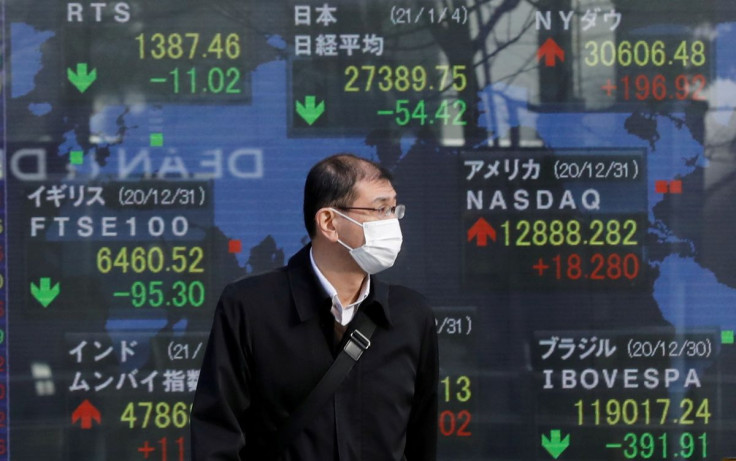Tech Earnings Buoy Stocks As Yen Slips To 20-year Low

The dollar was on the cusp on Thursday of its highest in two decades after the Bank of Japan doubled down on its ultra loose monetary policy, while technology stocks gained on strong earnings, led by a rally in Facebook parent Meta Platforms.
The yen dropped to a 20-year low and breached 131 per dollar, levels that had previously been highlighted as intervention territory, after the Bank of Japan vowed to buy unlimited amounts of 10-year bonds daily to defend its yield target.
The fall of the Japanese currency sent the U.S. dollar towards its highest in almost twenty years, weakened emerging market currencies and pushed borrowing costs for U.S. dollars in currency derivatives markets sharply higher.
The BoJ's move was in stark contrast with investors' conviction that U.S. interest rates are about to start going up fast and it jolted the dollar higher.
"The message from the monetary policy statement this morning is that the Bank of Japan refuses to budge, sticking with its unlimited bond buying plan to defend the 0.25% 10-year yield target," said Arne Petimezas, senior analyst at AFS Group.
The euro hit a five-year low against the dollar of $1.0481 before creeping back above $1.05, but was still on track for its worst monthly performance since January 2015.
The euro's drop to its lowest since 2017 is rekindling the possibility it will reach parity against the dollar for the first time in two decades, as fears of a euro zone recession encourage investors to pile on the bearish bets.
The weaker yen and euro pushed the dollar index to as high as 103.70, its strongest in five years. A further push above 103.82 would see it test levels not seen since late 2002.
Meanwhile, European stocks gained on solid corporate earnings, with the pan-European STOXX 600 rising 1.2%. Indexes in Frankfurt and Paris both added 1.9%.
London-listed bank Standard Chartered jumped 15.2% after upbeat quarterly earnings. Its Hong Kong-listed shares had earlier gained more than 10%.
Wall Street was set for gains, too.
Nasdaq and S&P futures were up 2.5% and 1.8% respectively after Facebook owner Meta beat Wall Street forecasts. Its shares are up by around 17% in the pre-market.
"Markets were quite fearful at the start of the earnings season but Meta's earnings last night seems to have calmed sentiment," said Kaspar Hense, senior portfolio manager at Bluebay Asset Management in London.
"It looks like we have turned a corner for the outlook for U.S. stocks and that should provide some relief to investors watching the dollar's rise."
Earlier, MSCI's broadest index of Asia-Pacific shares outside Japan rose 1.2%.
Japan's Nikkei rose 1.5%, its best day in two weeks, as investors cheered the weaker currency that helps Japanese exporters. Japanese government bonds had their best rally in a month.
U.S. government bonds were steady with the yield on the 10-year little changed at 2.8282%, ahead of U.S. growth data. The 10-year yield hit its highest level since 2018 last week.
An advance reading of first quarter U.S. GDP is expected to show an annualised 1.1% growth rate, down sharply from 6.9% in the 2021 fourth quarter. That would be the slowest since the recession triggered by the COVID-19 pandemic.
Set against that backdrop is investors' conviction that U.S. rates are rising and that next week's Federal Reserve meeting will bring the first of several consecutive 50-basis-point hikes.
Oil prices edged lower on caution about dwindling fuel demand in China caused by COVID-19 restrictions, with Brent crude futures down 0.5% and U.S. crude lower by 0.4%.
Spot gold prices hit their lowest level in two months and were last down 0.2% as the rally in the dollar weighed on the precious metal.
© Copyright Thomson Reuters 2024. All rights reserved.




















